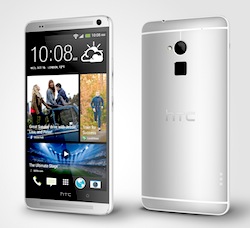HTC has become the second device manufacturer to launch a handset with fingerprint scanning technology.
The HTC One Max, which comes with a 5.9-inch Full HD display, is the first Android smartphone to come with the technology and only the second on the market following the Apple iPhone 5S.
However, last month the Chaos Computer Club hackers in Germany were able to crack the iPhone 5S’ TouchID fingerprint sensor in just 12 days is giving security experts doubts about how secure the technology actually is.
“The CCC’s successful attempt to circumvent the Touch ID technology suggests that Apple and HTC’s ‘highly secure’ implementation may not be secure enough,” said David Emm, senior security researcher at Kaspersky Labs.
“Because of the nature of fingerprints, you effectively leave your password everywhere you go so unless a fingerprint reader is able to fully distinguish between a real finger and a fake one, a fingerprint scan is a poor substitute for a password.
“If my passcode becomes compromised, I can simply replace it with a new one – hopefully one that’s more secure. But I can’t change my fingerprint – it’s part of what I am and so I’m stuck with it. So if someone is able to fool a fingerprint reader by spoofing the fingerprint, you can’t just find a new fingerprint.”
Nevertheless, Kaspersky Labs is keen on the fingerprint scanner, as currently most smartphone users don’t actually bother to secure their phones.
“Many people don’t use a PIN (let alone a more complex passcode) because of the hassle involved. So the ‘Fingerprint Scan’ may well have the effect of increasing the level of security for most people using an HTC,” said Emms.
Bruce Haldane, AVG Technologies’ VP of Customer Experience & Product Management, agrees that consumers don’t secure their phones properly, but feels that some measure is better than no measure at all.
“Any additional layer of security is always a good thing. It’s important to secure an Android device from infection using an anti-virus app, to manage privacy using a privacy app, and to lock the phone with either a PIN or a fingerprint lock,” he said.
“Our research shows that too many consumers do not protect their mobile devices with PINs and if fingerprint readers go some way towards making consumers secure entry to their smartphones that is a positive move. Fingerprint readers have been around for quite some time on laptops, however consumer adoption was very low.
“What we hear from our customers is some concern over privacy about scanning biometric data and what happens with that data – so it’s important for any company launching such a service to be very clear how a fingerprint scan is stored and secured.
“Fingerprint readers are likely not infallible, but they do protect you from the petty criminal who wouldn’t have access to the extensive equipment it takes to lift and duplicate a fingerprint. Similarly PINs are not infallible if someone is looking over your shoulder, or if you write your PIN down and carry it on your person.”
A large smartphone affectionately termed by the industry as a “phablet”, the HTC One Max features HTC’s custom Sense 5.5 mobile operating system, as well as Android 4.3 Jelly Bean.
Powered by a Qualcomm Snapdragon 600 processor, the handset is able to support 800 MHz, 900 MHz, 1800 MHz and 2600 MHz frequency bands in Europe and comes with NFC connectivity as well as Wi-Fi which supports IEEE 802.11 a, 802.11 ac, 802.11 b, 802.11 g and 802.11 n.
Read More:
Pattern Analytics develops software to spot fake fingerprints
Have you voted for your European Operator CTO of the Year? Click here to vote.



